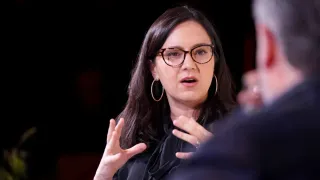
10 hours ago
Was Trump Always Against LGBTQ+ Rights? Everything in His Past Says No
Kate Sosin READ TIME: 6 MIN.
There was a sliver of hope for LGBTQ+ Americans upon Donald Trump’s first election to the presidency. For a Republican, at least, maybe he wouldn’t be so bad for the queer community. The former reality TV star had made promises. He said he would be a “friend” to LGBTQ+ people. He vowed to protect them.
And by all accounts, his past seemed to suggest he meant it. In 2000, during his short-lived bid for the Reform Party’s presidential nomination, Trump touted to LGBTQ+ magazine The Advocate that his New York upbringing instilled in him a kind of tolerance. He had no problem hiring gay people, he said.
“I like the idea of amending the 1964 Civil Rights Act to include a ban of discrimination based on sexual orientation,” he told The Advocate. “It would be simple. It would be straightforward.”
Trump’s pledge to update the Civil Rights Act didn’t come out of nowhere. LGBTQ+ advocates had been campaigning for that very same thing in the form of the Equality Act, which had failed to clear Congress since 1974.
Today, the idea of Trump supporting the Equality Act, which would bar discrimination against LGBTQ+ people in major areas of public life, seems far-fetched. But 25 years ago — even 10 years ago — Trump’s name was hardly synonymous with homophobia or transphobia. The real estate mogul had branded himself as agnostic on social issues if not liberal.
It was not until he took office and began courtship with major anti-LGBTQ+ organizations that Trump’s policies included a slate of anti-trans moves. Before that time, Trump expressed indifference, or even support for transgender people.
His past statements and behavior raise serious questions about the sincerity of his anti-trans animus now. Does he truly want to erase transgender people from public life? Or are they an unfortunate tool to curry favor with diehard conservatives? Would the president admit to either? And in the end, does it matter?
In 2012, when he co-owned the Miss Universe pageant, Trump praised that year’s Miss USA, Olivia Culpo, for stating that transgender women should be allowed to compete.
“But today where there are so many surgeries and so many people out there who have a need to change for a happier life, I do accept that because I believe it’s a free country,” said Culpo, who went on to be crowned Miss Universe.
“She gave a great answer, a very tough question — on transgender — just the question everybody wants to hear, and she gave a great answer and she really did a great job,” Trump said of Culpo on Fox and Friends in June 2012.
CNN also noted that Trump ended a ban on trans participation in his own pageants and cited Olympic rules, which allow transgender women to compete.
As recently as 2016, Trump repeatedly stated that transgender people should use whatever bathrooms they felt were appropriate .
Even as Trump had started to take a harder line against same-sex marriage by 2016, he was still quoted in the press saying that former Olympian turned reality TV star Caitlyn Jenner could use “any bathroom she chooses” in his own Trump Tower.
Most significantly, in 2016, Trump opposed North Carolina’s House Bill 2, one of the first bills of its kind in the country to require people to use the bathroom corresponding to their birth sex. The measure cost the state an estimated $3.7 billion amid boycotts from companies, sports leagues and entertainers. It was fully repealed in 2020.
According to The New York Times , Trump had noted that there had been very few problems to precipitate the ban.
“North Carolina did something — it was very strong — and they’re paying a big price,” Trump said. “And there’s a lot of problems. And I heard — one of the best answers I heard was from a commentator yesterday saying, leave it the way it is, right now.”
In 2016, The New York Times, considering his candidacy, concluded that Trump was simply a more gay-friendly option among the GOP presidential candidates that year, noting that he supported trans people using public restrooms and was rumored to be the first private club owner in Palm Beach, Florida, to welcome a gay couple.
Charlotte Clymer, a transgender writer and activist, said she remembers that the community was wary of Trump as a Republican before he took office in 2016.
“But it wasn’t as though he was attacking trans people at the time, he wasn’t,” she said. “What I recall is that there was no deep concern from anyone I followed over Trump’s feelings toward the trans community.”
All of that is a far cry from the Trump of today, who has made the eradication of transgender people from public life a hallmark of his second administration .
But in his first administration, advocates were still uncertain about what kind of president he would be for LGBTQ+ Americans, said a spokesperson for queer media nonprofit GLAAD, who asked not to use her name because staff from the organization now receive threats of violence for talking to the press on LGBTQ+ issues.
“The leadership at GLAAD started doing the Trump Accountability Project on the first day of the administration when they noticed that they removed all LGBTQ mention from the White House website,” said the spokesperson. “So we’ve been documenting the policies and statements ever since that day.”
As of publication, the Trump Accountability Tracker has counted 367 attacks against LGBTQ+ Americans by both of Trump’s administrations.
Asked to comment on Trump’s evolution on queer and trans issues, Abigail Jackson, a spokesperson for the White House, issued the following statement, in full:
“Woke Democrats want to destroy girls [sic] sports and threaten their private spaces by letting men compete against them and infiltrate their locker rooms and bathrooms. Millions of Americans agree with President Trump’s embrace of commonsense policy to protect women. The woke left’s support of transgender for everyone is a disgrace!”
In Trump’s inaugural speech in January, he vowed that his federal government would recognize just two genders: male and female. He has made good on that promise — trying to bar trans people from updating their passports, removing mentions of trans Americans from national monuments, issuing an executive order to ban trans girls from extracurricular sports, reinstating the ban on transgender people serving in the military, slashing funding for LGBTQ+ programs and trying to skirt federal law by placing transgender women detained in federal prisons with men.
GLAAD said it’s difficult to determine what changed for Trump between 2015 and now that has made him take such a hard line on transgender issues.
Clymer believes it was simple politics. Trans people, she said, are a tool Trump uses to rile GOP hardliners.
“I think that him making transphobia a centerpiece of his presidency is mostly about pandering to his base and the result of whomever was in his ear last at any given moment, and it just so happens that the vast majority of the people who are in his ear are anti-trans,” Clymer said. “I think you know, if tomorrow, his closest advisers told him to either chill out on transphobia or even become neutral again on trans issues, he would do so immediately.”
GLAAD’s research shows that less than 30 percent of Americans know a transgender person. Trump is part of that 30 percent. He knew the transgender contestants in his beauty pageants and was friends with Jenner before taking office.
But Trump is also aware that he is in the minority and is using that to his advantage, GLAAD said.
Ultimately, whether Trump truly feels hostility toward the LGBTQ+ community hardly matters, Clymer said.
“What are the policy outcomes of his presidency?” she asked. “By a mile, if you look at the results of his policies, he is by far, the most anti-LGBTQ president ever.”






